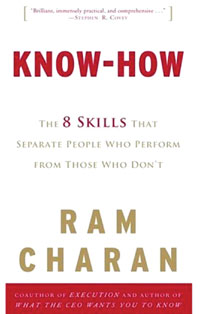 Ram Charan is a Texas-based Indian-American freelance business consultant. Fortune magazine puts his daily fee as high as $20,000. Charan has long-term contracts with GE and Home Depot offering practical advice on how they can make their already-strong global businesses even better.
Ram Charan is a Texas-based Indian-American freelance business consultant. Fortune magazine puts his daily fee as high as $20,000. Charan has long-term contracts with GE and Home Depot offering practical advice on how they can make their already-strong global businesses even better.
Charan has written and co-written 11 books, the latest of which is Know-How: The 8 Skills That Separate People Who Perform From Those Who Don't. After reading Know-How last week, I looked for ways that four of the eight skills Charan talks about provide food for thought for CEOs and heads of organisations in Nepal.
Position and re-position your business: Take Nepal's leading newspapers as an example. Their core product is news, which now has competitors in the form of blogs, FM radio stations, Google News and so on. Given this, what can media executives do to re-position newspapers? Should their web presence be completely revamped? Should newspapers do more tie-ups with TV, radio, mobile phones, and other websites? In addition to serving up news, should they also position themselves as providers of knowledge, interactions, and research?
Pinpoint external change: Most Nepali banks are sitting on piles of money, and stuck doing, what an ex-banker matter-of-factly calls 'plain vanilla' commercial banking work.
But the demands of the country for long-range growth are urgently clear. Nepal desperately needs more highways, better airports, power plants, tourism destinations, and other infrastructure projects. How can business leaders be credible spokespeople to convince the government to open regulatory doors so Nepalis' own money also gets reliably invested in development work that give multiple returns to both rural and urban Nepal?
Lead your business's social system: Many non-family business partnerships flounder sooner or later in Nepal because the level of trust is often low. True, arbitrary application of laws by government officers does little to reward basic transparency. But on the personnel side, doing well in tiny Nepal goes to most people's heads quickly, making them act like prima donnas who then start creating headaches for business partners and associates. These long-simmering internal quarrels make even businesses that start off doing well reach low points within a few years. Charan says that one business know-how skill to look for in a CEO is to see how she moulds teams "by getting the right people together with the right behaviours to achieve better business results."
Address societal pressures: The median age of 27 million Nepalis is 18. Youths make this country tick. From sending money home from abroad to calling for shutdowns and disrupting factories, what young people do significantly affects all businesses. Yet most business leaders carry on as if they are only interested in a few young graduates for entry-level jobs. Charan says non-market forces are increasingly influencing business results everywhere, and that an effective CEO is the one who finds creative ways to respond to societal pressures that cannot be controlled but do have an impact on the bottom line.
Charan's gentle downplaying of a CEO's personal attributes such as intelligence, self-confidence, and communication skills makes him a rare guru who does not mistake a CEO's articulateness for accomplishment. Charan surely knows too many executives with all the right personal attributes who ultimately failed because their business priorities were a mess. In a previous book, Charan celebrated the art of execution and the practice of getting things done. In this new one, he has given every CEO a tool-kit for stepping outside of their day-to-day frame of reference to really examine the ingredients of high performance.



